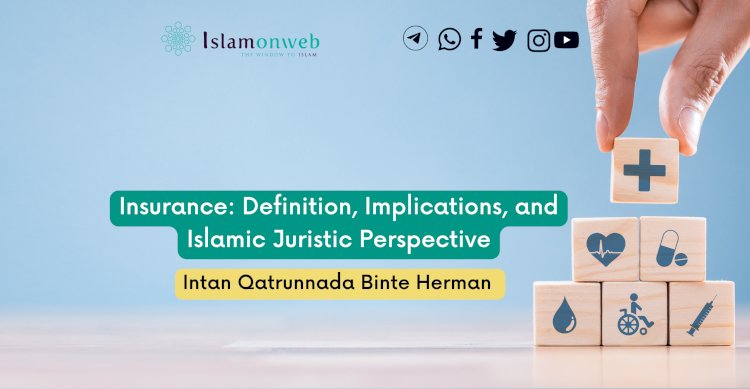Insurance: Definition, Implications, and Islamic Juristic Perspective
Introduction
In life, people are usually exposed to many risks that they might not be able to face with their own capabilities, so it is necessary to search for means that can guarantee compensation for the losses resulting from these risks. Insurance offers security for a person from the risks he is exposed to by distributing the harmful consequences of an accident to a group of individuals, where the group cooperates to cover the danger that is faced by each individual, ensuring his security and safety. Insurance came to light when many merchants in the past were reluctant to practise trading because of the risks they are exposed to during the process of shipping and transporting goods, which had negatively affected the national economy of countries. As a result, insurance companies appeared to guarantee their trading and insure the loss in exchange for an amount of money that the client paid in the form of a subscription[i].
Definition of Insurance and its Technical Foundations
The literal meaning of insurance is safety and security, and it is intended to reassure oneself by providing reasons for reassurance. In jurisprudence, insurance is a process whereby the client obtains in exchange for a consideration that he pays, which is the premium, the commitment of the other party, the insurer, to pay an amount in favour of the client or to a third party upon the occurrence of a specific risk.
The insurer manages cooperation between clients through a number of technical foundations including, firstly, the law of large numbers, where the more the number of policyholders increases, the more confident the insurance company is, its prediction will prove true. Secondly, probability calculation, where the insurer, by organizing cooperation between a number of clients, resorts to calculating the probabilities in which the client’s risks are realized. Thirdly, the combination of insurable perils. The risks that the clients combine must be homogeneous in nature, such as car accidents, bodily injury, and death, and they must be of similar value, the risks must be in scattering conditions where their occurrence should not be accumulated at one time for all the clients or for a large number of them, otherwise it would be impossible for the insurer to cover them due to the financial imbalance caused to the company, and the risks must be frequent, that is, their occurrence should be regular, otherwise the insurer would not be able to face his obligations before the clients.
Fourth, set-off between risks where the insurer will fail in organizing the existing cooperation between the clients unless the burden of risks and losses is distributed among them depending on the premiums they pay. Fifth, reinsurance and co-insurance. The insurer may be unable to fulfil his obligations towards his customers due to a mistake in calculating the probabilities of the occurrence of risks. Hence, the insurer resorts to reinsurance and co-insurance. Reinsurance is when the insurer transfers to a reinsurer all or part of the risks. The insurer is a party to two relationships, a relationship with the clients, and a relationship with the reinsurer. Co-insurance is the contribution of several insurers to cover the same risk within the framework of a single insurance contract[ii].
Elements and Classifications of Insurance
The elements of insurance include the risk, the premium, and the amount of compensation. An insured risk is an accident that is likely to occur, it may or may not materialize. The premium is the amount of money that the client is obligated to pay to the insurer in exchange for covering the risk from which he is insured. The insurer issues the compensation that he pledged to pay at the time of the disaster when the insured risk materialized. This issue can be in cash or others and may take the form of personal services.
Traditionally, insurance is classified into three main divisions; sea, land, and air. Sea insurance is related to the dangers that threaten ships, the cargo during voyages, or when they are docked in the port, and also every marine transport operation. Land insurance aims to cover the dangers that threaten a person on land, and it is divided into social insurance and private land insurance. Air insurance aims to cover the risks to which aircraft is exposed to, or caused by the aircraft during flights or when they stop at the airport.
Insurances are also divided according to their subject matter: damage insurance and insurance for people. Damage insurance deals with the risks that affect the liability of the client, and its purpose is to compensate for the loss incurred by the client as a result of the accident. Insurance for people is when a client insures himself against dangers that threaten in his body, life, or health. This includes life insurance, disease insurance, and injury insurance.
Lastly, insurance is classified into cooperative and commercial insurance. Cooperative insurance is when a group of people exposed to similar risks meet, and each of them pays a certain contribution, which is allocated to pay the compensation due to those who suffer damage. This group does not seek profit but rather aims to mitigate losses which are faced by some members. Hence, each one of them is the insurer and the other the client. Commercial insurance is when the client is obliged to pay a specific premium to the insurance company. This company consists of uninsured shareholders, and they aim to share the profits achieved[iii].
Roles of Insurance and its Defects
Insurance guarantees the client psychological comfort and confidence in the future. Insurance also plays an important role between countries as it allows the formation of capital, encourages credit, and allows rapprochement between countries globally.
There is no doubt that insurance offers many benefits, however, it also has its main downsides which can be divided into three aspects; the insurance company, the client, and perspective of religion. Firstly, in order to achieve profit, some insurance companies exaggerate in determining the value of premiums inconsistent with the value of the risk insured, and the poor groups are unable to pay it although they are more vulnerable to risks. Secondly, insurance can cause negligence of the clients in avoiding the occurrence of risks because they are reassured by insurance. Thirdly, insurance is sometimes characterized by the nature of gambling, as premiums are paid without realizing the insured risk. This raises some reservations from a religious point of view, which leads to the reluctance of many citizens to apply for it[iv].
Insurance: An Islamic Jurisprudence Perspective
Most contemporary scholars, academies and jurisprudence seminars have agreed on the prohibition of traditional commercial insurance. The reason for this prohibition is due to the involvement of uncertainty (gharar), interest (riba), and gambling elements (maysir)[v]. These three elements are prohibited in commutative contracts (‘Aqd Muʿāwadhat).
As narrated by Abu Hurairah, he said: “The Messenger of Allah Peace be Upon Him prohibited pebble sale and gharar sale” (Sahih Muslim). Allah SWT has clearly mentioned in the Quran on the prohibition of interest: “But Allah has permitted trading and forbidden interest” (2:275). It is also mentioned clearly in the Quran on the prohibition of gambling: “O believers! Intoxicants, gambling, idols, and drawing lots for decisions are all evil of Satan’s handiwork. So shun them so you may be successful” (5:90).
However, people still need a means that could ensure their compensation when they face certain risks. With that, scholars have suggested Takaful insurance or Islamic insurance, which is also known as cooperative insurance, as an alternative to traditional commercial insurance. Takaful insurance is when a group of shareholders build a company for Takaful insurance, where they will form an insurance portfolio and ask clients to contribute the insurance premium according to the rules and regulations set by the company. This portfolio will compensate the clients based on the conditions stated in the regulations. Thus, how does this differ from traditional commercial insurance?
The main difference between traditional commercial insurance and Takaful insurance is the type of contract. While the former is a commutative contract, the latter is a donation contract (‘Aqd Tabarruʿāt). The element of uncertainty (gharar) is prohibited in the first type of contract but is excused in the second. In addition, unlike traditional commercial insurance, the company of Takaful Insurance does not own the portfolio. The company’s role is to manage the portfolio by creating an independent account for the funds and returns, and a fee will be charged for this service. The company invests the portfolio funds on the basis of Mudharabah Syar’I (to a form of business contract in which one party brings capital and the other personal effort). Hence, the insurance portfolio funds increase with the increment of clients and with the profits made from the Mudharabah[vi].
In conclusion, Takaful insurance is allowed in Islam due to its cooperative nature that in is line with Islamic legal rules. The main purpose of Takaful insurance is not to make profit, but to help people[vii]. Allah has mentioned in the Quran: “Cooperate with one another in goodness and righteousness, and do not cooperate in sin and transgression” (5:2). Therefore, Muslims are encouraged to find Islamic alternatives in order to help one another in righteousness, and to ensure that the Maqasid Shariah related Hifz Maal (Protecting Wealth) is preserved.
Conclusion
Insurance was made as a collective means that aims to create a kind of cooperation between individuals in order to help them face the risks that any of them are exposed to. However, it is important to control the insurance companies in their terms and conditions to prevent clients from getting burdened while paying the premium. Clients also should not neglect their safety even after applying for insurance because some accidents cannot be covered fully by the agreed amount of compensation and may affect the clients negatively other than in terms of money. It is also important to scheme through the process of insurance especially for Muslims to ensure that their contracts are Shariah compliant. Hence, scholars have suggested Takaful insurance as a safer alternative.
Reference
Abdul Rahman An-Najdi, Rooting Takaful Insurance on The Basis of Endowment. Research in Contemporary Jurisprudence Issues.
Mughni Dalilah. Basic Concepts of Insurance. Algeria: University of Adrar.
(https://www.asjp.cerist.dz/en/downArticle/133/1/1/31590)
Internet Source(s):
https://www.islamweb.net/ar/fatwa/472/
About the author
Intan Qatrunnada Binte Herman is an undergraduate student of the Department of Fiqh and Usul al-Fiqh at International Islamic University (IIUM), Kuala Lumpur.
Endnotes
[i] Mughni Dalilah, Basic Concepts of Insurance, (Algeria: University of Adrar, n.d) p 259-260.
[ii] Mughni Dalilah, Basic Concepts of Insurance, (Algeria: University of Adrar, n.d) p 260-264.
[iii] Mughni Dalilah, Basic Concepts of Insurance, (Algeria: University of Adrar, n.d) p 264-268.
[iv] Mughni Dalilah, Basic Concepts of Insurance, (Algeria: University of Adrar, n.d) p 268-271.
[v] Abdul Rahman An-Najdi, Rooting Takaful Insurance on The Basis of Endowment, (Research in Contemporary Jurisprudence Issues, n.d) p 187.
[vi] Abdul Rahman An-Najdi, Rooting Takaful Insurance on The Basis of Endowment, (Research in Contemporary Jurisprudence Issues, n.d) p187-188
Disclaimer
The views expressed in this article are the author’s own and do not necessarily mirror Islamonweb’s editorial stance.

























Leave A Comment